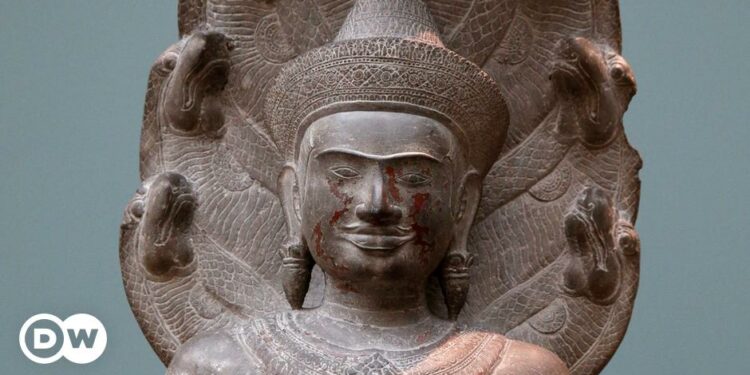To view this video please enable JavaScript, and consider upgrading to a web browser that supports HTML5 video
What’s the legal basis for returning artifacts?
The 1970 UNESCO Convention on the Means of Prohibiting and Preventing the Illicit Import, Export and Transfer of Ownership of Cultural Property is the principal legal source when a country claims to have its possessions returned.
But this convention “does not apply retrospectively, so it does not include the peak phase of colonialism,” according to a statement by the German Lost Art Foundation, an NGO.
“What is more, a very large number of countries would need to be involved in any such agreement: Ever since the 15th century, almost every region of the world has been part of colonial structures, at least for a certain period of time,” it added.
“As such, cultural objects and collections brought to Europe originate from a variety of different acquisition contexts, each of which potentially involves specific forms of handling.”
As a result, some European governments have proposed national laws to determine the fate of artifacts in their museums.
Last year, the Austrian government said it would propose legislation governing the restitution of objects in national museums acquired by colonialism by March 2024.
At the time, the Weltmuseum in Vienna admitted that many of its 200,000 objects might fit this bill, including antiquities from Southeast Asia.
However, similar laws proposed in other countries have run aground because of political opposition.
Berlin exhibition spotlights colonial-era theft
To view this video please enable JavaScript, and consider upgrading to a web browser that supports HTML5 video
Meanwhile, European museums have been reluctant to return some of their more valuable collections.
Despite Dutch museums returning hundreds of artifacts to Indonesia last year, it refused to hand over the remains of the “Java Man”, the first known fossil of the Homo Erectus species discovered during the colonial era.
However, scholars say the return of artifacts taken because of colonization can provide significant soft-power benefits for European countries, especially when they are trying to expand their influence in regions such as Southeast Asia.
“For Western governments, the repatriation of artifacts provides an ample opportunity to rebrand,” said Cameron Cheam Shapiro, an analyst who published an academic paper last year on the relationship between antiquities repatriations and soft power in Cambodia.
“These repatriations are a gesture of good faith, a commitment to international law, a symbol of their willingness to recognize and correct past wrongs, and a stepping stone towards better relations with foreign governments and peoples,” he added.
Netherlands apologizes for role in historic slave trade
A draft resolution presented to the European Parliament’s development committee in December claimed that the EU has made “no concerted efforts to recognize, address and rectify the lasting effects of European colonialism on social and international inequities” while also calling for the creation of a permanent EU body on restorative justice.
However, some European governments have explicitly sought to tie the return of stolen artifacts to their remorse for historical colonization.
Last year, Dutch Prime Minister Mark Rutte formally apologized for the Netherlands’ occupation of Indonesia a month before two Dutch museums returned looted artifacts to Jakarta.
“It’s a moment to look to the future,” Gunay Uslu, the Dutch secretary of state for culture and media, said at the time, adding that the return will engender “a period of closer cooperation with Indonesia” on research and academic exchanges.
According to Shapiro, if European museums were to return more of their collections, it would “represent a monumental step towards a larger soft power strategy in the region, especially where there seems to be residual anti-colonial sentiment”.
However, he added, if Europeans want to garner the same praise as the United States in Southeast Asia for returning artifacts, they will have to “make a more public display of their efforts and be willing to cooperate” with the region’s governments in their investigations.
Netherlands facing up to its colonial past
To view this video please enable JavaScript, and consider upgrading to a web browser that supports HTML5 video
Edited by: Keith Walker
Source link : https://www.dw.com/en/will-european-museums-return-southeast-asias-stolen-artifacts/a-68144451
Author :
Publish date : 2024-02-01 08:00:00
Copyright for syndicated content belongs to the linked Source.




